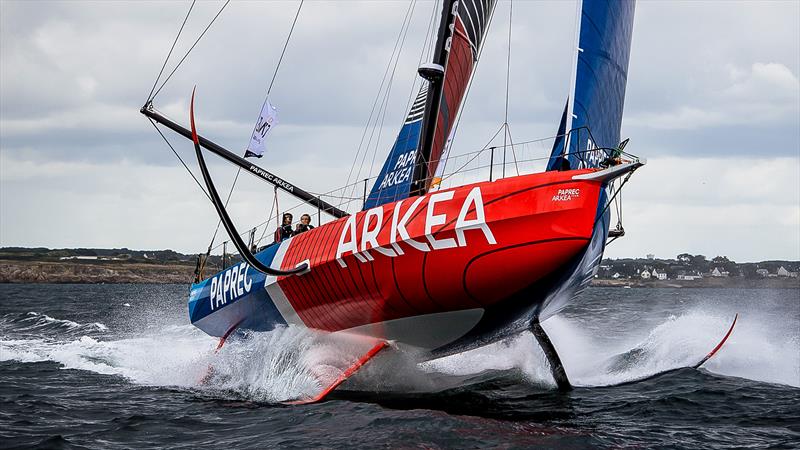
Vendee Globe: Dockwalk with Conrad Colman - the various IMOCA60s explained
by Richard Gladwell/Sail-World.com/nz 1 Nov 12:12 NZDT

Paprec Arkea (FRA) - Yoann Richomme is one of the favorites to win the 2024 Vendee Globe 2024 - Lorient - France © Jean-Louis Carli
New Zealand born and raised, USA educated, and now French resident Conrad Colman one of 40 competitors from 10 nations in the upcoming Vendee Globe. He explains the IMOCA60 fleet in a very entertaining, English language, dockwalk around the marina in Lorient.
For those new to the IMOCA60 concept, they are the AC75's of the transoceanic racing world, and used for a variety of shorthanded races from across the Atlantic and others like the 3500nm race to the Arctic Circle. They will also be used for the second time in the upcoming edition of The Ocean Race. This race will see a big expansion in womens sailing - with six sailors competing on merit in open fleet racing. Two are ranked in the top five on IMOCA60 season points.
The idea with the class is to avoid the redundancy of boats with each variant of race iteration - and this is now reflected in the Vendee Globe fleet, with the 40 boat fleet comprising a mix of boats that have been developed and raced in previous editions, and IMOCA60s that are new designs for this race. Colman's own boat MS Amlin is one of the oldest, but was reckoned to be too light - and as part of the preparation for this race was stripped back and a new carbon skin added to stiffen the hull and prevent it bending under rig loads.
The newer boats have opted for the complete protection and enclosure of the crew, who Colman jokes "do the race in their pajamas". The older boats are semi-foiling using dagger boards, others use the spectacular scimitar-like side foils which lift the hull clear of the water - in foiling conditions. The dagger board boats are probably more versatile than the full foilers - who rely on getting a good weather window and quickly building a catch-me-if-you-can margin on the rest of the fleet.
Now on his fifth single-handed, or double-handed race around the world, Colman has seen it all from capsize, dismasting, falling overboard, running out of food and electrical fire. He brings all this experience to bear on his boat, MS Amlin in this race, and in pointing out the very different features of the Vendee Globe fleet in the dockwalk.
In the dockwalk, Colman points out the features of boats, where they work, have been upgraded, and the different approaches to short-handed sailing - which is every bit as technically challenging, on a smaller scale, as seen in the recent America's Cup. Plus there are the unique approach to crew protection - including berths with seatbelts, a specially built seat, with shock absorbers and full angle adjustment. The risks are serious, without protection - with one sailor suffering a broken neck after being slammed into a bulkhead.
The Vendee Globe starts from Lorient in ten days. From what we have seen on the dockwalk several of the boats are very well set up with communications gear down to three levels of redundancy and systems, plus on board cameras.
While the Vendee Globe is hugely followed in Europe, other than capsizes in the Southern Ocean, the event doesn't get a lot of following in the Southern Hemisphere. That is expected to change in this race with more English speaking competitors sailing and providing reports and video. Predictwind is partnering the race, providing weather and routing information - which will make the race much more understandable, and easy to follow than previously.
Several hundred thousand fans will descend on Lorient for the start - making the Vendee Globe easily the most spectated event in sailing.
In the last event, which overlapped the final week of the 2021 America's Cup, the Vendee Globe outranked the Cup, as two boats, sailing singlehanded, matchraced to the finish after sailing 24,000nm and 80 days at sea.
For those who take their single handed sailing seriously, but don't want to get wet - there's a virtual race in which you can race against the 40 boat fleet and hundreds of thousands of other like minded sailors for the 80 day plus duration of the race.